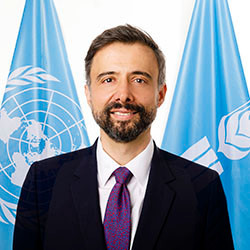Dakar 2 Summit Feed Africa: Food sovereignty and resilience
IFAD Asset Request Portlet
ناشر الأصول
Dakar 2 Summit Feed Africa: Food sovereignty and resilience
Statement by Alvaro Lario, President of IFAD
من Alvaro Lario
موقع: Dakar, Senegal
26 يناير 2023Permettez-moi de débuter mon intervention en remerciant nos hôtes de nous avoir réunis aujourd'hui : M. Akinwumi Adesina, président du Groupe de la Banque africaine de développement, et Son Excellence Macky Sall, président du Sénégal.
Ce sommet se déroule à un moment critique.
Au cours de l’année écoulée, la crise des denrées alimentaires, du carburant, des engrais et de l’inflation a été un signal d’alarme mondial.
Partout, y compris en Afrique, les petits producteurs ont souffert de l’impact combiné des hausses de prix et d’autres chocs. Et comme vous le savez -, les agriculteurs sont en première ligne face au changement climatique.
Il n’existe pas de solutions rapides.
Nous devons transformer l’agriculture en Afrique en partant de la base.
Mais au-delà de cela, nous nous devons de transformer les systèmes alimentaires. Cela signifie produire notre nourriture de manière plus efficace. Mais nous avons également besoin d’une nourriture de meilleure qualité, qui soutienne des régimes alimentaires plus nutritifs. C’est notre devoir de fournir des moyens de subsistance décents aux femmes, hommes et jeunes ruraux travaillant dans le secteur agricole. Enfin, des systèmes alimentaires rénovés devront favoriser un environnement plus sain et plus résilient, notamment en ce qui concerne les sols, l’eau et la biodiversité.
Je ne dis rien que vous ne sachiez déjà. Mais j’insiste sur l’urgence renouvelée de notre travail. Le moment est venu de faire de réels progrès et de redynamiser notre vaste programme.
En 2023, nous ferons le point sur les progrès réalisés depuis le Sommet sur les Systèmes Alimentaires tenu en 2021. Il est donc impératif d’avancer sur les importants engagements des pays d’Afrique, tels que la Déclaration de Malabo.
As we do this, we need all stakeholders around the table: Heads of State and government, ministers, private sector, international partners, central banks, and other financial institutions, and, very importantly, farmers and their organizations.
The agenda is complex and multi-faceted. We will only succeed by aligning our efforts and staying mutually accountable.
Clear visions for change set by African leaders are essential to guide us in the process, but we also need tools to turn visions into policy action and into concrete investment opportunities. It is there that the “food and agriculture compacts” launched at this Summit can make a big difference.
IFAD was pleased to work with governments and the African Development Bank to produce some of these compacts and we are committed to working with the Bank, with African governments, development partners, and most importantly with African farmers, to realize their objectives.
What does IFAD bring to the table?
IFAD invests in the people who are the backbone of African food systems – small-scale producers, women, and young entrepreneurs in rural areas.
Our job is to make sure these women, men, and youth have the tools, financial services, know-how, and support to drive change in agriculture and food systems.
That can mean everything from investing in inclusive and responsible value chains to promoting blended finance and innovative technology.
We are allocating 100% of donor contributions to low-income and lower-middle-income countries. Half of these funds go to sub-Saharan Africa, and at least half go to fragile countries in conflict-affected areas.
IFAD is a catalyst with an impact that goes far beyond our own modest size.
We’re skilled at assembling finance and bringing the big players together, including different parts of the private sector and climate finance. We use financial and non-financial tools – including knowledge, political capital and partnerships – to deliver solid results on the ground and achieve the SDGs.
In the coming months and years, I look forward supporting Africa’s agenda for food system change by contributing IFAD’s laser focus on small-scale producers and rural entrepreneurs, its commitment to Africa, and its capacity to mobilize and leverage diverse sources of capital and knowledge.
Je suis impatient de travailler avec vous tous, dirigeants et partenaires africains, à la réalisation de ce programme.
